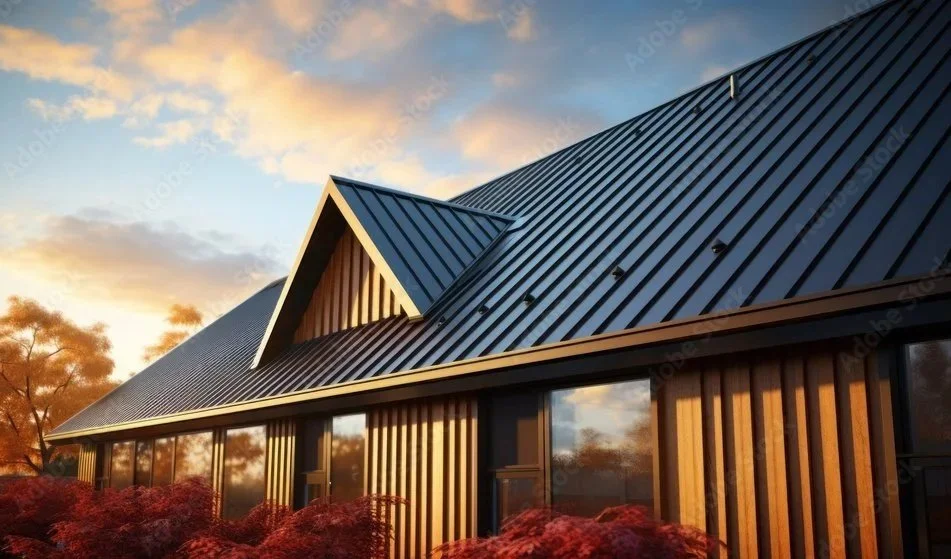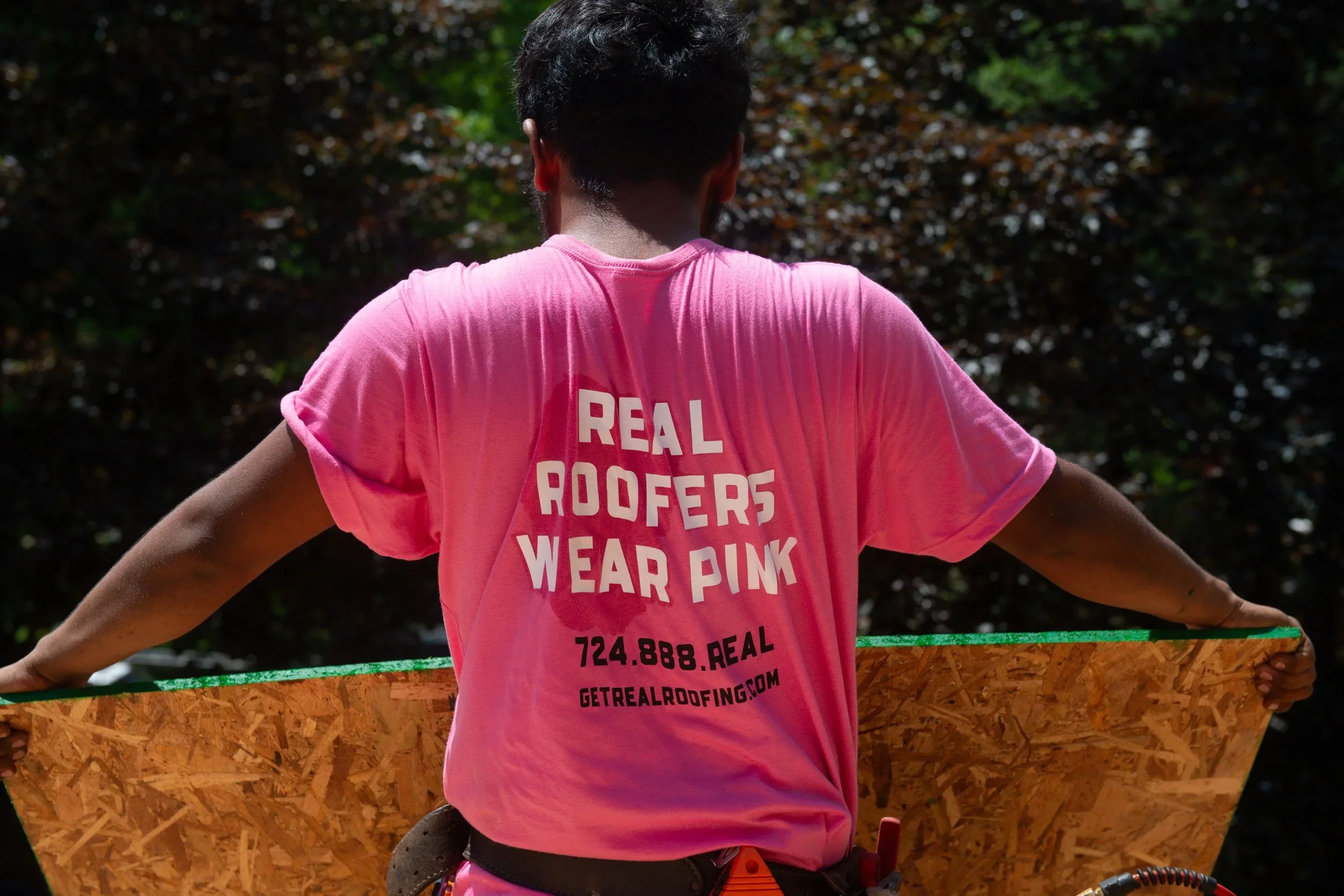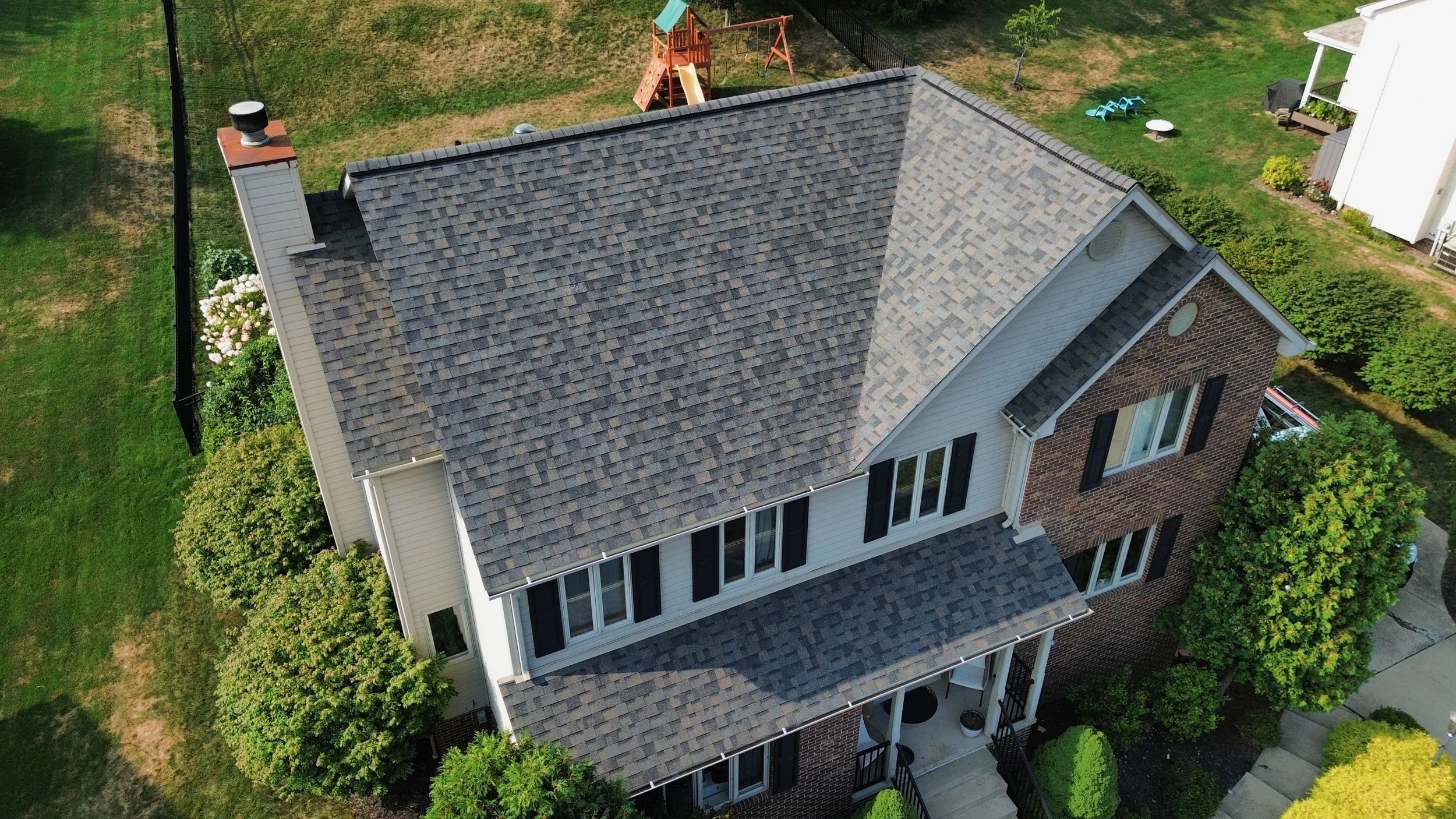How Long Does a Residential Roof Last? A Homeowner's Guide
Your roof's life expectancy will probably be anywhere from 20 to 50 years, though this depends on what it's made of, how well it was installed, and what Mother Nature throws at it. Here in Pittsburgh, brutal winters and wild temperature swings can shorten that timeline, so picking the right materials and staying on top of maintenance really matters if you want to get your money's worth.
When you need professional residential roofing services in Pittsburgh, you can count on Real Roofing Co. to handle repairs and replacements with care and expertise.
Roof Lifespan by Material Type
Asphalt Shingles
Asphalt shingles are the most common roofing material choice. There are three main types, each offering different life expectancy and levels of durability:
- Three-tab asphalt shingles: The basic option that typically lasts 15 to 20 years. With their simple design, they're the most affordable choice.
- Architectural shingles: These provide a step up in performance, delivering 25 to 30 years of protection. Their layered design creates visual depth while offering superior wind resistance and weather protection.
- Luxury shingles: This premium material can last 30 to 40 years with proper care. These heavy-duty shingles feature enhanced weather resistance and often carry Class 4 impact ratings for hail protection. While they require a larger upfront investment, their extended lifespan makes them cost-effective for long-term homeowners.
Pittsburgh's constant freezing and thawing slowly cracks and wears away the protective granules of asphalt shingles. But a roof that's installed right, with proper airflow and good ice protection, can still reach a higher lifespan even with our tough weather.
Metal Roofing
Metal is a highly durable material, so metal roofing offers exceptional longevity. Depending on the system and installation quality, they can protect homes for 40 to 70 years. This reliability makes metal attractive for homeowners planning to stay long-term.
Standing seam metal roofing provides the longest lifespan among metal options. These systems feature interlocking panels that expand and contract with temperature changes without creating stress points. Quality installations often last 50 to 70 years, so they are essentially a lifetime investment.

Metal shingle systems provide 30 to 50 years of protection while delivering a traditional roofing appearance. They cost less than standing seam systems but still deliver decades of reliable performance.
Steel roofing with quality coatings typically lasts 40 to 60 years, while aluminum systems can protect homes for 50 to 70 years. Premium metals like copper can last over a century, though their high cost limits widespread adoption.
Pittsburgh's weather conditions actually favor metal roofing. Snow slides off easily, preventing ice dam formation that plagues other roofing types. Metal's expansion capabilities handle dramatic temperature swings well, and quality coatings resist UV exposure that can fade other materials.
Natural Slate and Tile
Slate roofs last longer than almost anything else you can put on your house. A good slate installation can protect your home for 75 to 150 years, and some roofs from the 1800s still work perfectly today. High-quality slate, like the Welsh and Vermont varieties, handles weather damage better than manufactured alternatives and keeps looking good for decades longer than other materials. The material's natural properties resist freeze-thaw damage, UV degradation, and impact damage.
Clay and concrete tiles also provide impressive longevity, typically lasting 50 to 100 years with proper installation and care. These materials naturally resist fire, insects, and rot while maintaining their appearance far longer than manufactured alternatives.
Keep in mind that the substantial weight of natural materials requires adequate structural support. Most homes need reinforcement to safely carry slate or tile loads. A professional evaluation will determine whether your home can support these premium materials without modifications.
Synthetic Roofing
Synthetic roofing materials combine the appearance of premium natural materials with enhanced durability and lighter weight. These engineered products typically last 40 to 60 years.
One advantage of synthetic materials shows up during maintenance time. You can walk around on synthetic roofs to check things or make repairs without worrying about breaking tiles or cracking shakes. These products also handle hail damage better than many alternatives and resist the fading and water absorption problems that affect other roofing materials over the years.
The lighter weight means most homes can support these products without structural reinforcement. Despite its premium appearance, synthetic roofing installation costs are lower than natural alternatives.
Ready to install a new roofing system? Take a look at our residential roof replacements in Pittsburgh.
Factors That Impact Your Roof's Lifespan in Pittsburgh
Pittsburgh's Climate Challenges
Pittsburgh puts roofs through a lot during the year. Heavy snow piles up in winter, sometimes reaching two feet or more, which puts serious weight on your roof structure. Ice builds up along the edges and can push water back up under your shingles where it doesn't belong. The region's frequent freeze-thaw cycles cause materials to expand and contract repeatedly. This constant movement can loosen fasteners, crack sealants, and create entry points where water can infiltrate and cause damage.
Spring typically delivers heavy rainfall that tests drainage systems. Gutters clogged with winter debris can overflow during storms, causing water to back up under roofing materials or find other paths into your home's structure. Summer heat and UV exposure gradually break down roofing materials, with asphalt shingles being particularly vulnerable. Hot summer days can push roof surface temperatures past 150 degrees, especially on darker materials. That kind of heat speeds up the aging process and makes shingles brittle. Add in the storms that roll through with strong winds and hail, and your roof takes a beating from multiple directions throughout the year.
Installation Quality
Professional installation helps prevent roofing systems from failing years ahead of schedule. Poor workmanship creates problems that show up years later, while careful installation helps materials perform the way they should. Several installation details make the biggest difference in how long your roof lasts:
- Getting the nails in the right spots and at the right depth prevents wind damage
- Setting up ventilation correctly keeps moisture and heat from building up underneath
- Sealing around chimneys, vents, and other openings properly prevents the leaks that start in these areas
- Using quality underlayment gives you backup protection when the main roofing gets damaged
- Following the manufacturer's instructions instead of taking shortcuts helps materials work as designed
Maintenance and Care
Regular maintenance significantly extends your roof's lifespan while preventing small problems from developing into expensive repairs. Most homeowners can perform basic maintenance safely, while complex tasks require professional expertise. These practices will help extend roof life expectancy:
- Regular gutter cleaning to prevent water backup and ice dam formation during the winter months
- Post-storm visual inspections to identify damaged shingles, loose flashing, or debris accumulation
- Attic monitoring for water stains, damaged insulation, or ventilation problems
- Prompt repair of minor issues before they develop into major structural problems
- Professional maintenance programs that provide comprehensive care beyond homeowner capabilities
Does your roof need attention? Learn about our residential roof repairs in Pittsburgh.
Signs Your Pittsburgh Home Needs a New Roof
If you can recognize the warning signs of a failing roof, you can plan for a replacement before emergency situations arise. This will give you more time to research your options and make informed decisions. While age provides context, the actual condition of materials matters more than calendar years alone. Here are reliable indicators that your roof needs replacement rather than repair:
- Missing or damaged shingles throughout large roof areas, especially after storm events
- Granule loss creating bald spots on asphalt shingles or significant accumulation in gutters
- Curling or buckling shingles that no longer lie flat against the roof deck
- Cracked or split shingles exposing underlayment or deck materials to weather
- Interior water stains on ceilings or walls, particularly around roof penetrations
- Visible daylight through roof boards when inspecting your attic during the day
- Sagging roof sections indicating structural damage or inadequate support
- Damaged flashing around chimneys and vents that cannot be effectively repaired
- Energy bill increases that may indicate compromised insulation or ventilation
- Extensive moss or algae growth covering significant portions of roof surfaces
When problems show up in multiple areas of your roof, replacement usually makes more sense than trying to patch everything individually. A single damaged section might be worth repairing, but widespread deterioration means your roof has probably reached the point where continued fixes become more expensive than starting over.
Tips for Maximizing Your Roof's Lifespan
Getting the most years out of your roof comes down to making good choices at installation time and staying on top of basic maintenance afterward. These approaches help homeowners avoid early replacement while preventing the emergency repairs that always seem to happen at the worst times. Steps that genuinely extend roof life include:
- Choosing materials that handle Pittsburgh's weather well, like impact-resistant shingles
- Finding roofing contractors with experience in local conditions who follow proper installation procedures
- Making sure your attic has adequate airflow to prevent heat and moisture problems
- Keeping tree branches trimmed back so they don't scrape your roof or dump debris on it
- Having qualified professionals check your roof annually to catch developing problems
- Cleaning debris out of gutters and roof valleys, where it can hold water against your materials
- Checking your attic periodically for water stains, insulation damage, or airflow issues
- Keeping records of maintenance and repairs to support warranty claims if needed
Staying consistent with these basics can add several years to your roof's life while helping you avoid the expensive surprise repairs that disrupt your plans and budget.
Why Choose Our Professional Roofing Services
At Real Roofing Co., we've spent over 20 years helping Pittsburgh homeowners get the most from their roofing investments. Our extensive experience with local climate conditions, combined with our commitment to quality materials and expert workmanship, helps your roof reach its full lifespan potential.
As an Owens-Corning preferred contractor, we offer warranty coverage unavailable through standard contractors. Our installations include comprehensive 50-year material warranties with complete coverage and 10-year workmanship guarantees that exceed industry standards.

Our REAL philosophy guides every project: Relationship-centric experiences that prioritize your needs, Enlightened service through education and transparent communication, Affordability without compromise on materials or workmanship, and Locally rooted legacy with a deep understanding of Pittsburgh homes.
Whether you need complete roof replacement, targeted repairs, or ongoing maintenance through our Roof Rx program, we're committed to delivering exceptional results that stand the test of time. Request your free consultation and roof inspection today and discover why Pittsburgh homeowners trust Real Roofing Co. for their most important investment.
Frequently Asked Questions
How long should I expect my asphalt shingle roof to last in Pittsburgh?
Most asphalt shingle roofs in Pittsburgh last 20 to 30 years, depending on shingle quality and installation craftsmanship. Architectural shingles typically provide 25 to 30 years of protection, while three-tab shingles may need replacement after 15 to 20 years. Pittsburgh's freeze-thaw cycles can stress asphalt materials, so quality installation and consistent maintenance are important for reaching expected lifespans.
Do metal roofs really last longer than asphalt shingles?
Yes, metal roofs typically last 40 to 70 years compared to 20 to 30 years for asphalt shingles. Standing seam metal systems often provide 50+ years of protection, while metal shingles deliver 30 to 50 years of reliable performance. The higher upfront cost often balances out through extended lifespan and reduced maintenance requirements.
What factors most affect my roof's lifespan?
Installation quality, material choice, and maintenance practices have the biggest impact on roof lifespan. Professional installation following manufacturer specifications helps materials reach their full potential, while regular maintenance prevents small problems from becoming major failures. Pittsburgh's climate also affects performance, but proper ventilation and protection help roofs withstand local weather patterns.
Should I replace my roof before it starts leaking?
Planning replacement before failure prevents emergency situations and potential interior damage. Roofs showing multiple age-related problems like widespread granule loss, curling shingles, or damaged flashing should be replaced as soon as possible. A proactive approach allows you to choose materials and contractors carefully rather than making rushed decisions during emergency situations.
